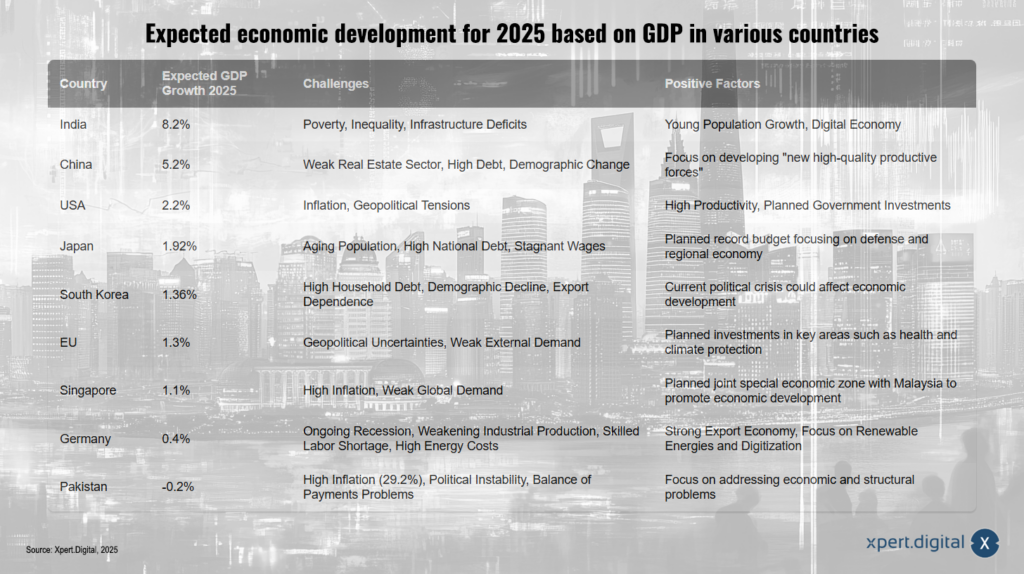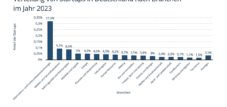Are 2% economic growth ok? When does the economy 'hums'? Comparison between the USA, China, EU, Japan, South Korea, India, etc.
Xpert pre-release
Language selection 📢
Published on: January 9, 2025 / Update from: January 9, 2025 - Author: Konrad Wolfenstein

Is 2% economic growth OK? When will the economy start to boom? Comparison between USA, China, EU, Germany, Japan, South Korea, India, Pakistan and Singapore - Image: Xpert.Digital
China in transition: How structural challenges influence economic growth
Economic growth of 2 % is generally considered solid, but not outstanding. In order to understand when an economy really “hums”, a precise analysis of different indicators and relationships is required. In the following, GDP growth, the current economic situation in Germany as well as possible drivers and challenges are examined.
Classification of 2% growth
Historically, growth of 2% is above Germany's long-term average, which was 2.4% from 1967 to 2024. However, in the current economic context, such growth would be a significant achievement, as forecasts for 2024 and 2025 are well below:
GDP growth forecasts for 2025 (selection)
- OECD: 0.7%
- Economic Advisory Council: 0.4%
- Institute for Macroeconomics and Economic Research (IMK): 0.7%
- Institute of German Economics (IW): 0.1%
- German Institute for Economic Research (DIW): 0.9%
- KfW Research: 0.5%
In 2023, Germany's gross domestic product shrank by 0.3%, putting the economy officially in recession. A slight decline of 0.2% is also expected for 2024. This would be the second year in a row with a negative growth rate - a rare event in Germany's post-war history.
Causes of the current recession
The current economic weakness has various causes:
- Declining export demand: Demand for German products has fallen sharply, particularly from China, a key trading partner.
- High energy prices: The energy crisis has increased production costs and affected the competitiveness of many companies.
- Restrictive monetary policy of the ECB: The European Central Bank has raised interest rates to combat inflation, but this is slowing investment activity.
- Structural problems in the German economy: These include the shortage of skilled workers, over-regulated bureaucracy and slow digitalization.
Despite these challenges, most institutions expect Germany to achieve slight growth in 2025, even if it remains low by international standards.
When does the economy “hums”?
A “humming” economy is characterized by several central features:
- High GDP growth: Values of 3-5% or more are considered an indicator of strong economic growth.
- Low unemployment: A strong labor market with increasing employment demonstrates economic vitality.
- Rising real wages: Higher incomes and growing purchasing power support private consumption.
- High capacity utilization: A well-utilized industry is a sign of demand growth.
- Positive mood among companies and consumers: optimism and trust in economic management are driving investments and consumption.
Historical examples of “buzzing” management
- Germany in the 1950s and 1960s: The “economic miracle” was characterized by high growth rates, full employment and increasing prosperity.
- China in the 2000s: With double-digit growth rates, the country became the “workbench of the world”.
- USA in the 2010s: Robust growth, low unemployment and innovative strength characterized the economy.
Industries as growth factors
Service sector
The service sector is the largest driver of economic growth in Germany:
- It contributes around 70% to gross value added.
- Around 75% of the workforce is employed in this area.
Important sub-areas
- Information and communication: One of the most dynamic areas with high growth potential. In Berlin, this sector grew by 6.2% in 2023.
- Finance and insurance industry: Internationally important, despite challenges from regulations and digitalization.
- Tourism and the trade fair industry: important economic sectors with a high regional influence.
Manufacturing/Industry
Industry remains a central pillar of the German economy, even if it faces challenges:
- It accounts for around 24% of gross value added.
Key industries
- Automotive industry: innovation leader in electromobility and autonomous driving.
- Mechanical engineering: world leader in precision technology.
- Chemical industry: Important export factor and supplier for numerous industries.
- Electrical industry: Central role in digitalization and automation.
Future industries with growth potential
- Renewable energies: An important driver of the energy transition and increasingly an export hit.
- Digital economy: IT and communications services account for around 55% of service exports.
- Healthcare industry: Medical technology and the pharmaceutical industry are strong growth areas.
- Deep Tech: Areas such as artificial intelligence, robotics and nanotechnology are considered future markets.
Rising consumer demand as an economic engine
Rising consumer demand has a direct impact on economic performance:
Direct effects on GDP
Private consumption accounts for around 50-60% of gross domestic product in Germany. An increase in consumer spending therefore directly increases economic output.
Multiplier effect
Higher consumer demand triggers the following effects:
- Companies are increasing their production.
- More employment leads to higher incomes.
- Additional income leads to further consumer spending.
This process is self-reinforcing and drives economic growth.
Investment incentives
Stable consumer demand encourages companies to invest in new production capacity, which promotes long-term productivity and growth.
Challenges of increasing consumer demand
- Inflation risks: Excessive demand can lead to price increases.
- Neglecting other growth factors: One-sided dependence on consumption can be problematic in the long term.
- Private debt: Higher credit-based consumption can lead to financial instability.
Germany faces significant challenges economically, but also has opportunities that need to be used. Growth of 2 % would be a success under current conditions. In the medium term, the promotion of future industries, strengthening consumption and structural reforms could lay the foundation for sustainable economic recovery. However, a “humming” economy requires far -reaching progress, especially in digitization, innovation and international competitiveness.
Our recommendation: 🌍 Limitless reach 🔗 Networked 🌐 Multilingual 💪 Strong sales: 💡 Authentic with strategy 🚀 Innovation meets 🧠 Intuition
At a time when a company's digital presence determines its success, the challenge is how to make this presence authentic, individual and far-reaching. Xpert.Digital offers an innovative solution that positions itself as an intersection between an industry hub, a blog and a brand ambassador. It combines the advantages of communication and sales channels in a single platform and enables publication in 18 different languages. The cooperation with partner portals and the possibility of publishing articles on Google News and a press distribution list with around 8,000 journalists and readers maximize the reach and visibility of the content. This represents an essential factor in external sales & marketing (SMarketing).
More about it here:
Expected economic development for 2025 according to GDP in different countries

Expected economic development for 2025 according to GDP in the various countries – Image: Xpert.Digital
India
- Expected GDP growth in 2025: 8.2%
- Challenges: poverty, inequality, infrastructure deficits
- Positive factors: young population growth, digital economy
China
- Expected GDP growth in 2025: 5.2%
- Challenges: Weak real estate sector, high debt, demographic change
- Focus on the development of "new high -quality productive workers"
USA
- Expected GDP growth in 2025: 2.2%
- Challenges: inflation, geopolitical tensions
- Positive factors: high productivity, planned government investments
Japan
- Expected GDP growth in 2025: 1.92%
- Challenges: Aging population, high national debt, stagnating wages
- Planned record budget with a focus on defense and the regional economy
South Korea
- Expected GDP growth in 2025: 1.36%
- Challenges: High household debt, demographic decline, export dependence
- Current political crisis could affect economic development
EU
- Expected GDP growth in 2025: 1.3%
- Challenges: Geopolitical uncertainties, weak external demand
- Planned investments in key areas such as health and climate protection
Singapore
- Expected GDP growth in 2025: 1.1%
- Challenges: High inflation, weak global demand
- Planned joint special economic zone with Malaysia to promote economic development
Germany
- Expected GDP growth in 2025: 0.4%
- Challenges: Ongoing recession, weakening industrial production, shortage of skilled workers, high energy costs
- Positive factors: Strong export economy, focus on renewable energies and digitalization
Pakistan
- Expected GDP growth in 2025: -0.2%
- Challenges: High inflation (29.2%), political instability, balance of payments problems
- Focus on addressing economic and structural problems
The economic growth development of Germany: 1960-2023
The growth rates of the German gross domestic product (GDP) from 1960 to 2024 cover an extensive time interval. Here is an overview of annual GDP growth rates (real), based on available historical data.
Growth rates of real GDP in Germany (1960–2024)
1960s
- 1960: +8,1 %
- 1961: +4,4 %
- 1962: +4,5 %
- 1963: +2,6 %
- 1964: +5,7
- 1965: +4,8 %
- 1966: +4,0 %
- 1967: -0.2% (recession)
- 1968: +4,4 %
- 1969: +8,0 %
1970s
- 1970: +5,0 %
- 1971: +3,1 %
- 1972: +4,1 %
- 1973: +5,3 %
- 1974: -0.9% (oil crisis)
- 1975: -1.2% (recession)
- 1976: +5,6 %
- 1977: +3,4 %
- 1978: +3,2 %
- 1979: +4,0 %
1980s
- 1980: +1,2 %
- 1981: -0,3 %
- 1982: -0,8 %
- 1983: +1,3 %
- 1984: +2,6 %
- 1985: +2,3 %
- 1986: +2,1 %
- 1987: +1,3 %
- 1988: +3,4 %
- 1989: +3,8 %
1990s: (reunification and aftermath)
- 1990: +5,7 %
- 1991: +5,1 %
- 1992: +2,2 %
- 1993: -1,0 %
- 1994: +2,3 %
- 1995: +1,9 %
- 1996: +0,7 %
- 1997: +1,5 %
- 1998: +2,1 %
- 1999: +2,0 %
2000s
- 2000: +3,1 %
- 2001: +1,5 %
- 2002: +0,0 %
- 2003: -0,7 %
- 2004: +1,1 %
- 2005: +0,7 %
- 2006: +3,9 %
- 2007: +3,4 %
- 2008: +1,1 %
- 2009: -5.7% (financial crisis)
2010s
- 2010: +4.2% (recovery from financial crisis)
- 2011: +3,7 %
- 2012: +0,4 %
- 2013: +0,4 %
- 2014: +2,2 %
- 2015: +1,7 %
- 2016: +2,2 %
- 2017: +2,6 %
- 2018: +1,3 %
- 2019: +0,6 %
2020s: (COVID-19 pandemic and geopolitical tensions)
- 2020: -4.6% (pandemic)
- 2021: +2.7% (partial recovery)
- 2022: +1,9 %
- 2023: +0,3 %
- 2024: -0,2 %
- There are different forecasts for 2024:
- The federal government forecasts a decline of -0.2%.
- The Bundesbank expects growth of 0.3% (June).
- HWWI: Hamburg Institute of International Economics (September): 0.2%
- RWI: Rhenish-Westphalian Institute for Economic Research (September): 0.1%
- IWH: Institute for Economic Research Halle (September): 0%
- IMK: Institute for Macroeconomics and Business Cycle Research (September): 0%
- DIW: German Institute for Economic Research (September): 0%
- IfW: Kiel Institute for the World Economy (September): -0.1%
- HRI: Handelsblatt Research Institute (September): -0.3%
- IMF: International Monetary Fund (July): 0.2%
- ifo: Institute for Economic Research University of Munich (June): 0.4%
- Economic Advisory Council (May): 0.2%
- The ifo Institute recently forecast stagnation (0.0% growth). The forecasts for 2024 were revised downwards several times during the year. Economic development is slowed by various factors, including:
- High inflation and energy prices
- Weak foreign demand
- Hesitant private consumption
- Higher financing costs for investments
- Despite the different forecasts, there are indications that the German economy will experience very low growth at best in 2024 and may even remain in a technical recession.
Recession – Technical Recession
A technical recession refers to an economic situation in which a country's gross domestic product (GDP) declines in two consecutive quarters compared to the previous quarter. This is the most common and simplest definition of a recession, although some economists argue that additional factors such as production utilization, demand or the state of the labor market should be taken into account.
In most countries, the economic quarters are broken down as follows:
- Quarter (Q1): January 1st to March 31st
- Quarter (Q2): April 1st to June 30th
- Quarter (Q3): July 1st to September 30th
- Quarter (Q4): October 1st to December 31st
This classification is used for standardized analysis and reporting of economic data, such as: B. the gross domestic product (GDP).
Germany has been in a technical recession since the winter half of 2023/24. Specifically:
- In the fourth quarter of 2023, economic output shrank by -0.3%.
- In the first quarter of 2024, GDP fell by another -0.1%.
These two consecutive quarters of negative economic growth meet the definition of a technical recession.
It is important to note that this situation is different than expected. Many experts had originally hoped that the German economy would recover in 2024. Instead, the economic weakness continued. The reasons for this are varied and include, among other things, the sluggish global economy, consumer restraint due to high inflation rates, increased interest rates and geopolitical uncertainties.
Despite this technical recession, the situation is “not as dramatic” as with a “adult recession”. The effects have so far been relatively mild, and there is hope (currently still different forecasts, see above) on gradual recovery in the second half of 2024. Nevertheless, the economic situation in Germany remains challenging, and it is expected that economic growth for the entire year 2024 will be very low.
We are there for you - advice - planning - implementation - project management
☑️ SME support in strategy, consulting, planning and implementation
☑️ Creation or realignment of the digital strategy and digitalization
☑️ Expansion and optimization of international sales processes
☑️ Global & Digital B2B trading platforms
☑️ Pioneer Business Development
I would be happy to serve as your personal advisor.
You can contact me by filling out the contact form below or simply call me on +49 89 89 674 804 (Munich) .
I'm looking forward to our joint project.
Xpert.Digital - Konrad Wolfenstein
Xpert.Digital is a hub for industry with a focus on digitalization, mechanical engineering, logistics/intralogistics and photovoltaics.
With our 360° business development solution, we support well-known companies from new business to after sales.
Market intelligence, smarketing, marketing automation, content development, PR, mail campaigns, personalized social media and lead nurturing are part of our digital tools.
You can find out more at: www.xpert.digital - www.xpert.solar - www.xpert.plus


























